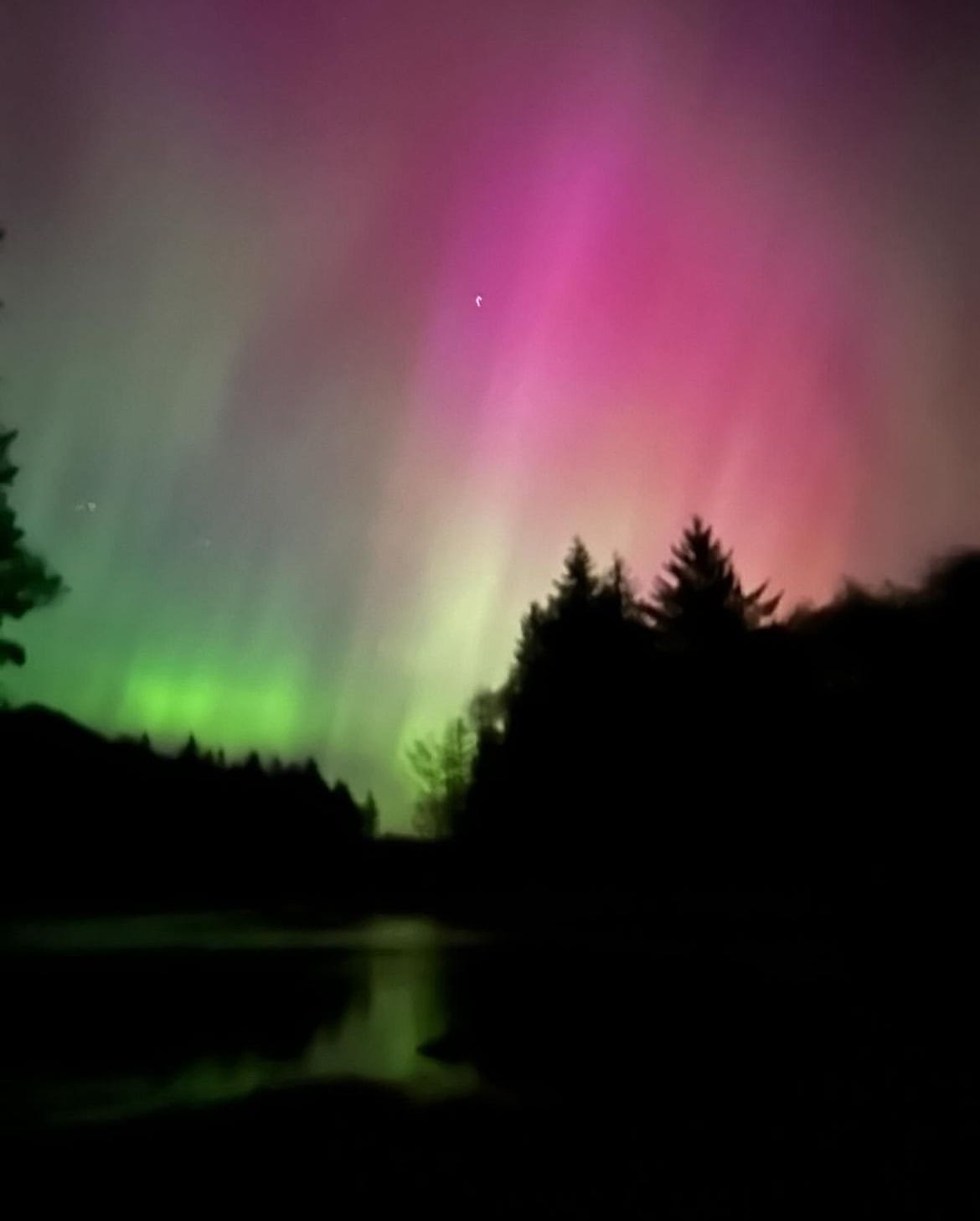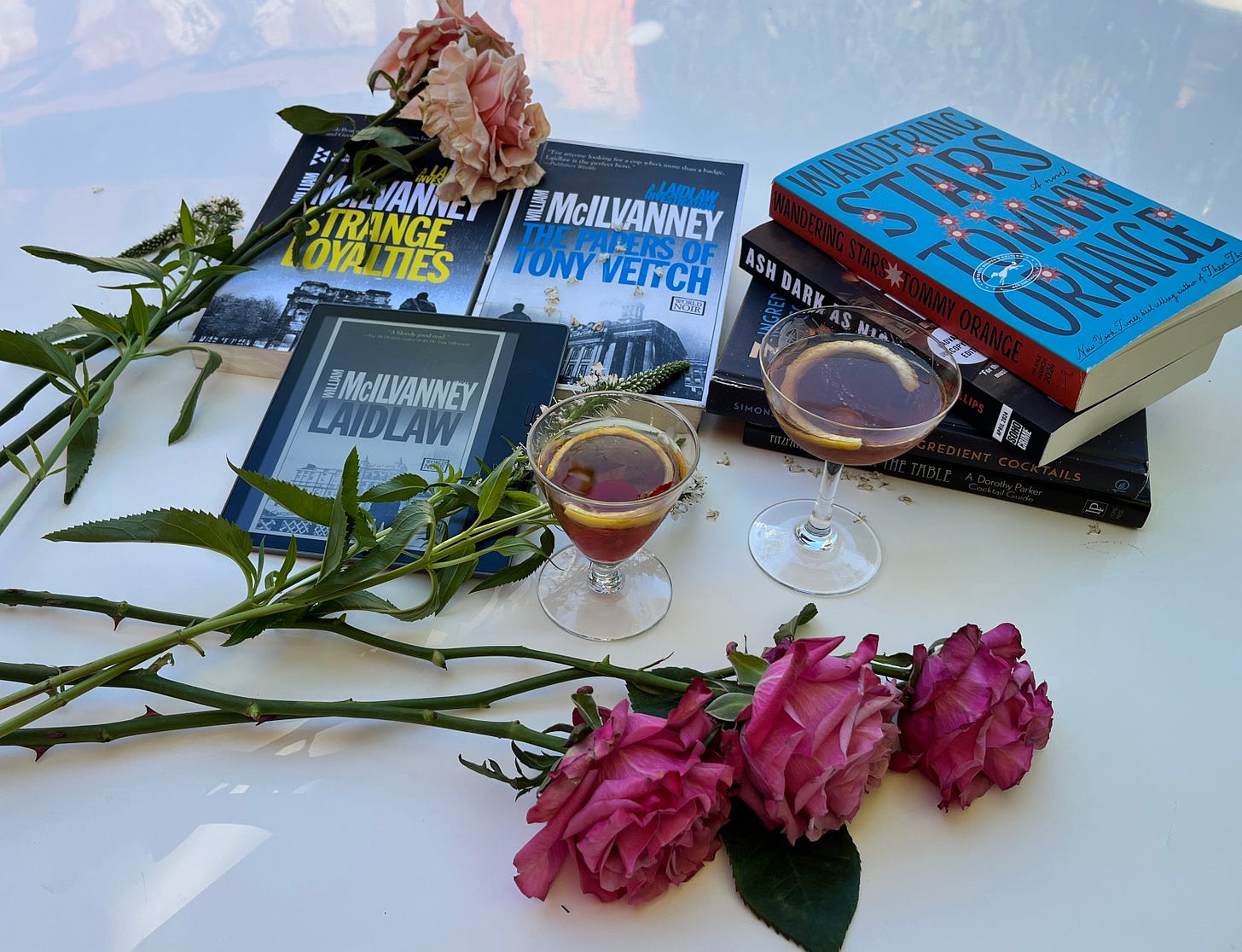Blood & Whiskey #36
William McIlvanney's "Tartan Noir" and thoughts on series. Also Tommy Orange, Gary Phillips, my Pinkertons podcast, and more. Plus the Rob Roy two ways.
Hey friends and readers,
I recently plowed through most (but not all — more on that in a sec) of the trilogy by late Scottish writer William McIlvanney, featuring hard-bitten Glasgow cop Jack Laidlaw. The first, Laidlaw, was published in 1977, followed by The Papers of Tony Veitch in 1983, with Strange Loyalties closing out the series in 1991. McIlvanney, who also wrote poetry and literary fiction, died in 2015 at 79.
The Laidlaw novels got tagged as “Tartan Noir” (allegedly coined by James Ellroy, although McIlvanney preferred Noire) and they inspired Scottish writers like Val McDermid (“He kicked open the door”) and Ian Rankin ("It's doubtful I would be a crime writer without the influence of McIlvanney's Laidlaw"). Like Agatha Christie’s detectives, Raymond Chandler’s Marlowe, and Georges Simenon’s Maigret, Laidlaw is smarter than everyone else around him and knows it. He’s tetchy and stubborn. He quotes poetry and mostly does things his way. I won’t bother with much about the plot, cuz that’s not really the point with these books, but in short: book 1 is the brutal murder of a teenage girl (and we know who dunnit from the start); book 2 is a gangster’s murder and a missing college student; book 3 is the death of Laidlaw’s brother. What binds them and elevates them are the gritty streets and smoky pubs and underworld brutes of Glasgow. Also Laidlaw himself and the quirky Scottish dialect McIlvanney often (but not always) spells out phonetically, which I found both intriguing and sometimes tedious to follow. (I = Ah, to = tae, no = nae, wouldn’t = widny, and etc.)
McIlvanney is at his best describing the walking wounded of Glasgow, especially Laidaw. A deputy is assigned to work with him is warned: “Laidlaw? You’ll have to wear wellies when you work with him. To wade through the tears. He thinks criminals are underprivileged. He’s not a detective. He’s a shop-steward for neds. It’ll be a great experience for you. Boy Robin meets Batman.”
He’s also often funny. Of one thug, he writes: “He wore a shirt like an action-painting, sleeves rolled up to show impressive hairy forearms. Melted down, the silver buckle of his belt could have saved the economy.”
He’s been described elsewhere as "Raymond Chandler meets Albert Camus" and a writer who "transcends the conventions of the crime novel even while he observes them.” Reading these three books got me thinking about the experience of committing yourself to an ongoing series, the relationship that evolves between reader and, say, Louise Penny’s Inspector Gamache, William Kent Krueger’s Cork O’Connor, Mick Herron’s Jackson Lamb. My shelves are stacked with a dozen such series. I love collecting them and seeing their matching covers lined up, reminding me of good times spent in their pages. But also? I sometimes run out of steam (I did with Louise Penny, even though I loved contributing to the
newsletter last year). Sometimes I just get a little tired of the same cast of characters and want a new book.Okay, enough on that. If you have any series you’d recommend, I’d love to hear from you (in the comments below). Other faves: Daniel Silva, Cara Black, Joe Ide, Andrea Camillieri, Ken Bruen, and the Marseilles Trilogy I wrote about in 2022.
Ash Dark as Night, by Gary Phillips
I’d heard his name for years but had yet to dive in, then I saw him on the bill at the recent Left Coast Crime convention outside Seattle, and then got a galley of his latest from friends at Soho Crime. And… Phillips is amazing, a revelation, ranks right there with Ellroy and Mosley. It’s August of 1965 and at the onset of the Watts riots photographer Harry Ingram (the previous book introduced him: One Shot Harry) takes a photo of cops killing an unarmed man. Harry gets pummeled but his photo gets published, and the twisty story spirals out from there, featuring his girlfriend, who happens to rob banks, and a mother seeking a son who disappeared during the riots. Smart, funny, and sexy, with a bunch of catchy historical asides and lots of grudging love for effed up L.A. A total blast.
For more, here’s a nice review of One Shot Harry in the Washington Post.
Wandering Stars, by Tommy Orange
His 2018 debut, There, There, put him on the map, but this new one will keep him there. We follow Jude Star’s escape from the Sand Creek Massacre of 1864, from Colorado to the Fort Marion prison in Florida and then Oklahoma, where Jude’s son, Charles, is born. Charles later ends up at the new Carlisle Indian Industrial School, run by Richard Henry Pratt. Students are forced to cut their long hair, wear uniforms, eschew any native rites, rituals, ceremonies. In short, to become white. Time moves quickly across the first 100+ pages, until we get to 2018 and things slow down. We meet the descendants of the massacre — reintroduced to characters from There, There — most facing the same hardships: assimilation and addiction, inheritance and identity, sorrow and survival. Wandering Stars is a story of inherited wounds: timely, urgent, beautifully written and terribly sad.
Lit bits…
Listening: The first episode of a series I wrote about the Pinkerton Detective Agency is now up on Spotify ( wherever you get your podcasts):
Watching: Speaking of dialects (see Laidlaw above), The Tourist, starring Jamie Dornan (the 50 Shades stud) as an amnesiac bad guy trying to be good, is packed with them: Northern Irish, Australian, Greek, Columbian. Season 1 is good not great; Season 2 is meh, but still fun and mostly worth it.
Wishing for: The martinis in Gary Shteyngart’s tour for the New Yorker. And if you haven’t yet, check out his cruise ship horror story in The Atlantic. Oh, and his Substack newsletter,
.Winning: Ed Park (Same Bed, Different Dreams was named a Pulitzer finalist) and Ben Fountain (won the Joyce Carol Oates Prize — his latest is Devil Makes Three). Both are Blood & Whiskey alums.
Watching: Northern lights! We missed them when they blazed through Seattle (watching The Tourist) but my son was camping on the Olympic Peninsula with friends and saw versions of this for an hour…
Cocktail of the Month
First, a shoutout to two whiskey distillers in my home state who won top honors (i.e. “Double Gold”) at the San Francisco World Spirits Competition: Woodinville Whiskey Co., for its Straight Bourbon Whiskey, and Bainbridge Organic Distillers, for its Yama Mizunara Cask Whiskey. When we first moved to Seattle, I wasn’t impressed by any West Coast whiskeys — too wheaty and flat compared to the bourbons I’d gotten used to in North Carolina (and the legit moonshines I’d sampled while “researching” my book, Driving With the Devil). But the whiskeys of the west have come a long way. I plan to try the Woodinville soon and will report back. I’d love to try the Yama Mizunara, but… not for 600 bucks. Unless a Blood & Whiskey sponsor cares to donate a bottle? It’d be for a good cause.
Now, onto the Rob Roy… I’ve also never been much of a scotch drinker, but McIlvanney’s Laidlaw and the streets of Glasgow inspired me to crack open a dusty bottle (still in the box) of Macallan 12 Year Single Malt, a years-ago gift from pal Julie’s boyfriend Ben (also known as just Ben). It’s probably sacrilege to use a great sipping scotch for a mixed cocktail, but it was delicious.
Btw, the origin of the drink comes from NYC’s Waldorf Hotel, in honor of the cast and crew of the popular 1894 play, Rob Roy, performed at the nearby Herald Square Theater, about the Scottish gangster Rob Roy MacGregor.
Rob Roy #1
(the classic — from
’s great 3-Ingredient Cocktails)2 oz. scotch
1 oz. sweet vermouth
2 dashes Angostura bitters
Shake scotch, vermouth and bitters with ice in cocktail shaker; strain into coupe or martini glass; garnish w/lemon twist
Rob Roy #2
(from Under The Table: A Dorothy Parker Cocktail Guide)
2.5 oz. scotch
.75 oz. sweet vermouth
.75 oz. dry vermouth
3 dashes Angostura bitters
Shake scotch, vermouth and bitters with ice in cocktail shaker; strain into coupe or martini glass; garnish w/Maraschino cherry
Thanks for reading, everyone. Always grateful for your comments, questions, likes, shares, book suggestions, newsletter suggestions, or quick hellos.
And if you’d like to support my writing, consider subscribing:
Or just:
Btw, I'm sending this from Mexico City, which means next month’s newsletter will be heavy on the tequila.
Hasta luego,
-Neal
Find me @ Instagram; sometimes Facebook, Twitter, LinkedIn, Goodreads






Just read One Shot Harry a few weeks ago. It's great! So I'm glad to hear there's a sequel. I got very strong Walter Mosley vibes, less so Ellroy. To me, Ellroy is always so pessimistic. But there's an optimism to Mosley and Phillips. Still very much works of noir, but Harry and Easy are heroes that bend toward some kind of progress (personal, professional, political, etc.) I never really get a sense of progress, let alone hope, from Ellroy. But to be fair I've only read a few of his books. The LA Quartet and Blood on the Moon.
Reading Wandering Stars right now so I'll come back when I finish!